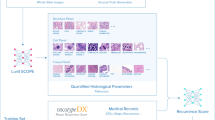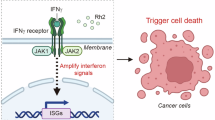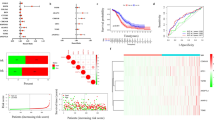Abstract
Insulin-like growth factors (IGFs) I and II are implicated in progression of various tumours including colorectal carcinomas. To interfere with the production of IGFs, we treated male nude mice bearing xenografts of HT-29 human colon cancer with various potent growth hormone-releasing hormone (GH-RH) antagonists. Twice daily injections of antagonist MZ-4-71, 10 μg intraperitoneally or 5 μg subcutaneously (s.c.) resulted in a significant 43–45% inhibition of tumour growth. Longer acting GH-RH antagonists, MZ-5-156 and JV-1-36 given once daily at doses of 20 μg s.c. produced a 43–58% decrease in volume and weight of cancers. Histological analyses of HT-29 cancers demonstrated that both a decreased cell proliferation and an increased apoptosis contributed to tumour inhibition. GH-RH antagonists did not change serum IGF-I or IGF-II levels, but significantly decreased IGF-II concentration and reduced mRNA expression for IGF-II in tumours. In vitro studies showed that HT-29 cells produced and secreted IGF-II into the medium, and addition of MZ-5-156 dose-dependently decreased IGF-II production by about 40% as well as proliferation of HT-29 cells. Our studies demonstrate that GH-RH antagonists inhibit growth of HT-29 human colon cancers in vivo and in vitro. The effect of GH-RH antagonists may be mediated through a reduced production and secretion of IGF-II by cancer cells. © 2000 Cancer Research Campaign
Similar content being viewed by others
Article PDF
Change history
16 November 2011
This paper was modified 12 months after initial publication to switch to Creative Commons licence terms, as noted at publication
References
Baserga R (1995) The insulin-like growth factor I receptor: a key to tumour growth. Cancer Res 55: 249–252
Bernhardt G, Reile H, Birnbock H, Spruss T and Shonenberger H (1992) Standardized kinetic microassay to quantify differential chemosensitivity on the basis of proliferative activity. J Cancer Res Clin Oncol 118: 35–43
Blakesley VA, Stannard BS, Kalebic T, Helman LJ and LeRoith D (1997) Role of the IGF-I receptor in mutagenesis and tumour promotion. J Endocrinol 152: 339–344
Csernus V, Schally AV and Groot K (1999) Antagonistic analogs of growth hormone-releasing hormone (GHRH) inhibit cyclic AMP production of human cancer cell lines in vitro. Peptides 20: 843–850
D'Ambrosio C, Ferber A, Resnicoff M and Baserga R (1996) A soluble insulin-like growth factor I receptor that induces apoptosis of tumour cells in vivo and inhibits tumorigenesis. Cancer Res 56: 4013–4020
elAtiq F, Garrouste F, Remacle-Bonnet M, Sastre B and Pommier G (1994) Alterations in serum levels of insulin-like growth factors and insulin-like growth-factor-binding proteins in patients with colorectal cancer. Int J Cancer 57: 491–497
Garrouste FL, Remacle-Bonnet MM, Lehmann NM-A, Marvaldi JL and Pommier GJ (1997) Up-regulation of insulin/insulin-like growth factor-I hybrid receptors during differentiation of HT29-D4 human colonic carcinoma cells. Endocrinology 138: 2021–2032
Hardcastle JD (1997) Colorectal cancer. CA-A Cancer J Clin 47: 66–69
Jones JI and Clemmons DR (1995) Insulin-like growth factors and their binding proteins: biological actions. Endocrine Rev 16: 3–34
Kiaris H and Schally AV (1999) Decrease in telomerase activity in U-87MG human glioblastomas after treatment with an antagonist of growth hormone-releasing hormone. Proc Natl Acad Sci USA 96: 226–231
Kovacs M, Zarandi M, Halmos G, Groot K and Schally AV (1996) Effects of acute and chronic administration of a new potent antagonist of growth hormone-releasing hormone in rats: Mechanisms of action. Endocrinol 137: 5364–5369
Kovacs M, Schally AV, Zarandi M and Groot K (1997) Inhibition of GH release in rats by new potent antagonists of growth hormone-releasing hormone (GH-RH). Peptides 18: 431–438
Labianca R, Pessi MA and Zamparelli G (1997) Treatment of colorectal cancer. Drugs 53: 593–607
Lahm H, Suardet L, Laurent PL, Ficher JR, Ceyhan A, Givel J-C and Odartchenko N (1992) Growth regulation and co-stimulation of human colorectal cancer cell lines by insulin-like growth factor I, II and transforming growth factor α. Br J Cancer 65: 341–346
Lahm H, Amstad P, Yilmaz A, Fischer JR, Givel JC, Odartchenko N and Sordat B (1996) Differential effect of interleukin-4 and transforming growth factor beta 1 on expression of proto-oncogenes and autocrine insulin-like growth factor II in colorectal carcinoma cells. Biochem Biophys Res Commun 220: 334–340
Lamharzi N, Schally AV, Koppan M and Groot K (1998) Growth hormone-releasing hormone antagonist MZ-5-156 inhibits growth of DU-145 human androgen-independent prostate carcinoma in nude mice and suppresses the levels and mRNA expression of insulin-like growth factor II. Proc Natl Acad Sci USA 95: 8864–8868
Lelievre V, Meunier AC, Caigneaux E, Falcon J and Muller JM (1998) Differential expression and function of PACAP and VIP receptors in four human colonic adenocarcinoma cell lines. Cell Signal 10: 13–26
Lobie PE, Breipohl W and Waters MJ (1990) Growth hormone receptor expression in the rat gastrointestinal tract. Endocrinology 126: 299–306
Ma J, Pollak MN, Giovannucci E, Chan JM, Tao Y, Hennekens CH and Stampfer MJ (1999) Prospective study of colorectal cancer risk in men and plasma levels of insulin-like growth factor (IGF)-I and IGF-binding protein-3. J Natl Cancer Inst 91: 620–625
Macaulay VM (1992) Insulin-like growth factors and cancer. Br J Cancer 65: 311–320
Magnusson BA, Raju RVS, Moyana TN and Sharma RK (1995) Increased N-myristoyl-transferase activity observed in rat and human colonic tumours. J Natl Cancer Inst 87: 1630–1635
Mayo KE (1992) Molecular cloning and expression of a pituitary-specific receptor for growth hormone-releasing hormone. Molec Endocrin 6: 1734–1744
Michell NP, Langman MJS and Eggo MC (1997) Insulin-like growth factors and their binding proteins in human colonocytes: preferential degradation of insulin-like growth factor binding protein 2 in colonic cancers. Brit J Cancer 76: 60–66
Mohan S and Baylink DJ (1996) Editorial: Insulin-like growth factor (IGF)-binding proteins in serum – do they have additional roles besides modulating the endocrine IGF actions?. J Clin Endocrinol Metab 81: 3817–3820
Munson PJ and Rodbard D (1980) Ligand: a versatile computerized approach for characterization of ligand-binding systems. Anal Biochem 107: 220–239
Orme SM, McNally RJQ, Cartwright RA and Belchetz PE (1998) Mortality and cancer incidence in acromegaly: A retrospective cohort study. J Clin Endocrinol Metab 83: 2730–2734
Pinski J, Schally AV, Groot K, Halmos G, Szepeshazi K, Zarandi M and Armatis P (1995) Inhibition of growth of human osteosarcomas by antagonists of growth hormone-releasing hormone. J Natl Cancer Inst 87: 1787–1794
Pollak MN and Schally AV (1998) Mechanism of antineoplastic action of somatostatin analogs. Proc Soc Exp Biol Med 217: 143–152
Pollak MN, Perdue JF, Margolese RG, Baer K and Richard M (1987) Presence of somatomedin receptors on primary human breast and colon carcinomas. Cancer Lett 38: 223–230
Pollak M, Polychronakos C and Guyda H (1989) Somatostatin analogue SMS 201–995 reduces serum IGF-I levels in patients with neoplasms potentially IGF-I dependent. Anticancer Research 9: 889–891
Raderer M, Kurtaran A, Hejna M, Vorbeck F, Angelberger P, Scheithauer W and Virgolini I (1998) 123I-labelled vasoactive intestinal peptide receptor scintigraphy in patients with colorectal cancer. Br J Cancer 78: 1–5
Reubi JC (1995) In vitro identification of vasoactive intestinal peptide receptors in human tumours: implications for tumour imaging. J Nucl Med 36: 1846–1853
Schally AV (1994) Hypothalamic hormones: from neuroendocrinology to cancer therapy. Anti-Cancer Drugs 5: 115–130
Schally AV, Kovacs M, Toth K and Comaru-Schally AM (1998) Antagonistic analogs of growth hormone-releasing hormone (GH-RH): endocrine and oncological studies. In: Bercu BB, Walker RF, eds. Growth hormone secretagogues in clinical practice, New York: Marcel Dekker; 145–162
Singh P and Rubin N (1993) Insulinlike growth factors and binding proteins in colon cancer. Gastroenterology 105: 1218–1237
Singleton JR, Randolph AE and Feldman EL (1996) Insulin-like growth factor I receptor prevents apoptosis and enhances neuroblastoma tumorigenesis. Cancer Res 56: 4522–4529
Szepeshazi K, Korkut E and Schally AV (1991) Decrease in the AgNOR number in Dunning R3327 prostate cancers after treatment with an agonist and antagonist of luteinizing hormone-releasing hormone. Am J Pathol 138: 1273–1277
Toretsky JA and Helman LJ (1996) Involvement of IGF-II in human cancer. J Endocrinol 149: 367–372
Tricoli JV, Rall LB, Karakousis CP, Herera L, Petrelli NJ, Bell GI and Shows TB (1986) Enhanced levels of insulin-like growth factor messenger RNA in human colon carcinomas and liposarcomas. Cancer Res 46: 6169–6173
Varga JL, Schally AV, Csernus VJ, Zarandi M, Halmos G, Groot K and Rekasi Z (1999) Synthesis and biological evaluation of antagonists of growth hormone-releasing hormone with high and protracted in vivo activities. Proc Natl Acad Sci (USA) 96: 692–697
Westley BR and May FEB (1995) Insulin-like growth factors: the unrecognised oncogenes. Br J Cancer 72: 1065–1066
Williams NN, Gyorfi T, Iliopoulos D, Herlyn D, Greenstein D, Linnenbach AJ, Daly JM, Jensen P, Rodeck U and Herlyn M (1992) Growth-factor-independence and invasive properties of colorectal carcinoma cells. Int J Cancer 50: 274–280
Zarandi M, Horvath JE, Halmos G, Pinski J, Nagy A, Groot K, Rekasi Z and Schally AV (1994) Synthesis and biological activities of highly potent antagonists of growth hormone-releasing hormone. Proc Natl Acad Sci USA 91: 12298–12301
Zarandi M, Kovacs M, Horvath JE, Toth K, Halmos G, Groot K, Nagy A, Kele Z and Schally AV (1997) Synthesis and in vitro evaluation of new potent antagonists of growth hormone-releasing hormone (GH-RH). Peptides 18: 423–430
Author information
Authors and Affiliations
Rights and permissions
From twelve months after its original publication, this work is licensed under the Creative Commons Attribution-NonCommercial-Share Alike 3.0 Unported License. To view a copy of this license, visit http://creativecommons.org/licenses/by-nc-sa/3.0/
About this article
Cite this article
Szepeshazi, K., Schally, A., Groot, K. et al. Antagonists of growth hormone-releasing hormone (GH-RH) inhibit IGF-II production and growth of HT-29 human colon cancers. Br J Cancer 82, 1724–1731 (2000). https://doi.org/10.1054/bjoc.2000.1223
Received:
Revised:
Accepted:
Published:
Issue date:
DOI: https://doi.org/10.1054/bjoc.2000.1223
Keywords
This article is cited by
-
Antiproliferative effect of growth hormone-releasing hormone (GHRH) antagonist on ovarian cancer cells through the EGFR-Akt pathway
Reproductive Biology and Endocrinology (2010)
-
Triple-negative breast cancers express receptors for growth hormone-releasing hormone (GHRH) and respond to GHRH antagonists with growth inhibition
Breast Cancer Research and Treatment (2009)
-
Knocking down gene expression for growth hormone-releasing hormone inhibits proliferation of human cancer cell lines
British Journal of Cancer (2008)
-
Antagonists of growth-hormone-releasing hormone: an emerging new therapy for cancer
Nature Clinical Practice Endocrinology & Metabolism (2008)
-
The role of the insulin-like growth factor system in colorectal cancer: review of current knowledge
International Journal of Colorectal Disease (2005)



